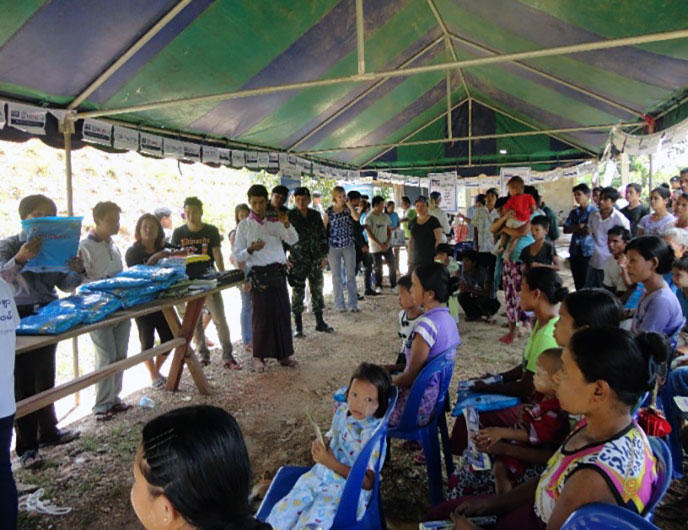
PMI project staff and a Malaria Inspector from Kawthaung (Burma) provide instruction to Burmese migrant workers on how to use long-lasting ITNs during a community malaria event in Ranong (Thailand). Credit: USAID/Thailand
Malaria is a persistent foe along the forested border between Thailand and Burma. In these remote areas, health services are limited and reaching a health facility can be arduous. Rubber plantations in Ranong Province, located in southwestern Thailand, employ a large number of Burmese migrants who account for a large portion of the malaria burden in the area. In La-un District for example, approximately two-thirds of malaria cases occur among Burmese migrant workers. Furthermore, 25 percent of all patients diagnosed with a Plasmodium falciparum infection in this district have gametocyte forms of the malaria parasites in their blood, indicating that patients did not seek care for weeks after being infected or after the first symptoms appeared. Migrant workers are particularly at risk since they are required to work at night, which increases their risk of being bitten by Anopheles mosquitoes – the malaria vectors. These populations are also less likely to seek care given language barriers as well as their often limited knowledge of the Thai health system. Given that migrant workers from Burma can freely cross back and forth between Ranong (in Thailand) and Kawthaung township (in Burma), this has implications for malaria transmission as they also transport malaria parasites, which can re-infect populations in Burma.
To provide better access to malaria services for both local residents and for migrants in Ranong Province, the President’s Malaria Initiative (PMI) supported provincial and district health offices to expand malaria service outlets at the community level. With PMI’s support, new Malaria Posts were established and, at existing health facilities, malaria services were integrated together with primary health care. Sign posts along roads direct patients to the service site, where a trained malaria worker provides malaria diagnosis using rapid diagnostic tests (RDTs) and treatment with artemisinin-based combination therapies (ACTs) for positive cases. Malaria workers reinforce the importance of taking the entire three-day treatment to their clients using information, education, communication materials written in both Thai and Burmese. Patients also receive a patient treatment card in Thai and Burmese, which they can show to other health providers they visit either in Thailand or Burma.
Malaria Posts are located in a malaria worker’s home, strategically located in endemic villages near border crossings so that migrants can easily stop by for malaria diagnosis and treatment. PMI-supported staff from Kawthaung (Burma) have trained health volunteers among the migrant population to provide malaria education, distribute long-lasting insecticide-treated mosquito nets (ITNs), help bring migrants with fever in for testing and assist with follow-up visits to those migrants who test positive for malaria. As health services are still being developed in Burma, events have been held to extend malaria services for families and rubber plantation workers on the Burmese side of the border (e.g., long-lasting ITN distributions and malaria diagnostic testing). During the past year, 1,420 local Thai residents and migrants have been tested for malaria, and the 34 patients who tested positive were treated with ACTs according to Thailand’s national treatment guidelines.
